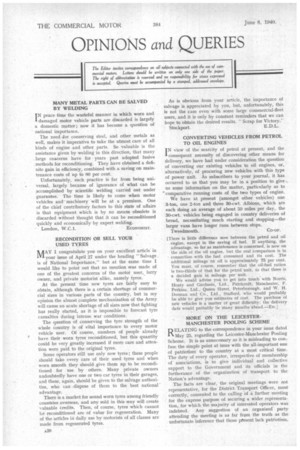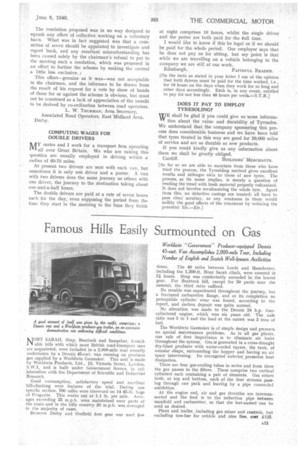OPINIONS and QUERIES The Editor invites correspondence on all subjects
Page 22

Page 23

If you've noticed an error in this article please click here to report it so we can fix it.
connected with the use of commercial motors. Letters should be written on only one side of the paper. The right of abbreviation is reserved and no responsibility for views expressed is accepted. Queries must be accompanied by a stamped, addressed envelope.
MANY METAL PARTS CAN BE SALVED BY WELDING IN peace time the wasteful manner in which worn and damaged motor vehicle parts are discarded is largely a domestic matter ; now it has become a question of national importance.
The need .for conserving steel, and other metals as well, makes it imperative to take the utmost care of all kinds of engine and other parts. So valuable is the assistance given by welding in this direction, that many large coacerns have for years past adopted fusive methods for reconditioning. They have obtained a definite gain in efficiency, combined with a saving on maintenance costs of up to 80 per cent.
Unfortunately, such practice is far from being universal, largely because of ignorance of what can be accomplished by scientific welding carried out under guarantee. The time is likely to come when motor vehicles and machinery will be at a premium. One of the chief contributory factors to this state of affairs is that equipment which is by no means obsolete is discarded without thought that it can be reconditioned quickly and economically by expert welding,
London, W.C.1. ECONOMIST.
RECONDITION OR SELL YOUR USED TYRES MAY I congratulate you on your excellent article' in your issue of April 27 under the heading "Salvage is of National Importance," but at the same time I would like to point out that no mention was made of one of the greatest concerns of the motor user,. lorry owner, and private motorist alike, namely tyres.
At the present time new tyres are fairly easy to obtain, although there is a certain shortage of commercial sizes in various parts of the country, but in my opinion the almost complete mechanization of the Army will cause an acute shortage of all sizes now that fighting has really started, as it is impossible to forecast tyre casualties during intense war conditions.
The question of conserving the tyre strength of the whole country is of vital importance to every motor vehicle user. Of course, numbers of people already have their worn tyres reconditioned, but this quantity could be very greatly increased if more care and attention were paid to the original tyres.
Some operators still use only new tyres; these people should take every care of their used tyres and when worn smooth they should give them up to be reconditioned for use by others. Many private owners undoubtedly have one or two car tyres in their garages, and these, again, should be given to the salvage authorities, who can dispose of them to the best national advantage.
There is a market for sound worn tyres among friendly countries overseas, and any sold in this way will create valuable credits. Then, of course. tyres which cannot be reconditioned are of value for regeneration. Many of the articles in daily use by motorists of all classes are made from regenerated tyres. As is obvious from your article, the importance of salvage is appreciated by you, but, unfortunately, this is not the case even with some large commercial-fleet users, and it is only by constant reminders that we can hope to obtain the desired results. "Scrap for Victory.'
Stockport. E .D. L.
CONVERTING VEHICLES FROM PETROL TO OIL ENGINES I N view of the scarcity of petrol at present, and the consequent necessity of discovering other means for delivery, we have had under consideration the question of converting our existing vehicles to oil engines, or, alternatively, of procuring new vehicles with this type of power unit. As subscribers to your journal, it has occurred to us that you may be in a position to give us some information on the matter, particularly as to • comparative running costs of the two types of engine. We have at present (amongst other vehicles) one 3-ton, one 2-ton and three 30-cwt. Albions, which are each doing an average of about 50 miles per day, the 30-cwt vehicles being engaged in country deliveries of bread, necessitating much starting and stopping—the larger vans have longer runs between stops.
Tweedmouth.
LThere is little difference now between the petrol and oil engine, except in the saving of fuel. If anything, the advantage, so far as maintenance is concerned, is now on the side of the oil engine, hut the real comparison is in connection with the fuel consumed and its cost. The additional mileage on oil is approximately 75 per cent. You must, of course, remember that the oil-fuel ration is two-thirds of that for the petrol unit, so that there is a decided gain in mileage per unit.
We would advise yoU to get into touch with Norris. Henty and Gardners, Ltd., Patricroft, Manchester, F. Perkins, Ltd., Queen Street, Peterborough, and W. H. Dorman and Co., Ltd., Stafford, who would probably be able to give you estitnates of cost. The purchase of new vehicles is a matter of great difficulty; the delivery date would probably he many months ahead.—En.;
MORE ON THE LEICESTER.
MANCHESTER POOLING SCHEME
RELATING to the correspondence in your issue dated May 25, regarding the Leicester-Manchester Pooling Scheme. It is as unnecessary as it is misleading to confuse the simple point at issue with the all-important one of patriotism to the country at a most critical time. The duty of every operator, irrespective of membership of associations, is to give individual and collective support to the Government and its officials in the furtherance of the organization of transport to the Nation's advantage.
The facts are clear, the original meetings were not representative, for the District Transport Officer, most correctly, consented to the calling of a further meeting for the express purpose of securing a wider representation, for which the majority of interested operators was indebted. Any suggestion of an organized party attending the meeting is as far from the truth as the unfortunate inference that those present lack patriotism. The resolution proposed was in no way designed to squash any effort of collective working on a voluntary basis. What was in fact suggested was that a committee of seven should be appointed to investigate and report back, and any resultant misunderstanding has been caused solely by the chairman's refusal to put to the meeting such a resolution, which was proposed in an effort to further the scheme by making the control a little less exclusive. /
This effort—genuine as it was—was not acceptable to .ihe chairman, and the inference to be drawn from the result of his request for a vote by show of hands of those for or against the scheme is obvious, but must not be construed as a lack of appreciation of the benefit to be derived by co-ordination between road operators. L. W. THURMAN, Area Secretary, Associated Road Operators, East Midland Area. Derby.
COMPUTING WAGES FOR DOUBLE DRIVERS NAY mates and I work for a transport firm operating I" all over Great Britain. We who are raising this question are usually employed in driving within a radius of 60-70 miles.
At present two drivers are sent with each van, but sometimes it is only one driver and a porter. A van with two drivers does the same journey as others with one driver, the journey to the destination taking about one-and-a-half hours.
The double drivers are paid at a rate of seven hours each for the day, even supposing the period from the time they start in the morning to the time they finish at night comprises l0 hours, whilst the single driver and the porter are both paid for the 4ull time.
I would like to know if this be legal or if we should be paid for the whole period. Our employer says that he does not pay us for sitting, but my point is that while we are travelling on a vehicle belonging to the company we are still at our work.
Edinburgh. FAITHFUL READER.
cOn the facts as stated in your letter I am of the opinion that both drivers must be paid for the time worked, i.e., for 10 hours on the days when they work for so long and other days accordingly. Each is, in any event, entitled to pay for not less than 48 hours per week....S.T.R.]
DOES IT PAY TO EMPLOY TYRESOLING?
WE shall be glad if you could give us 'some information about the value and durability of Tyresoles. We understand that the company sponsoring this process does considerable business and we have been told that tyres treated in this way are good for 20,000 miles of service and are as durable as new products. If you could kindly give us any information about them we shall be greatly obliged.
Cardiff. BUILDERS' MERCHANTS.
[So far as we are able to ascertain from those who have tried the process, the Tyresoling method gives excellent results and mileages akin to those of new tyres. The process, as its name implies, is merely a question of resoling the tread with fresh material properly vulcanized. It does not involve revulcanizing the whole tyre. Apart from this, no defective casings are treated; all have to pass close scrutiny, as any weakness in them would nullify the good effects of the treatment by reducing the potential life.—ED.]




















































